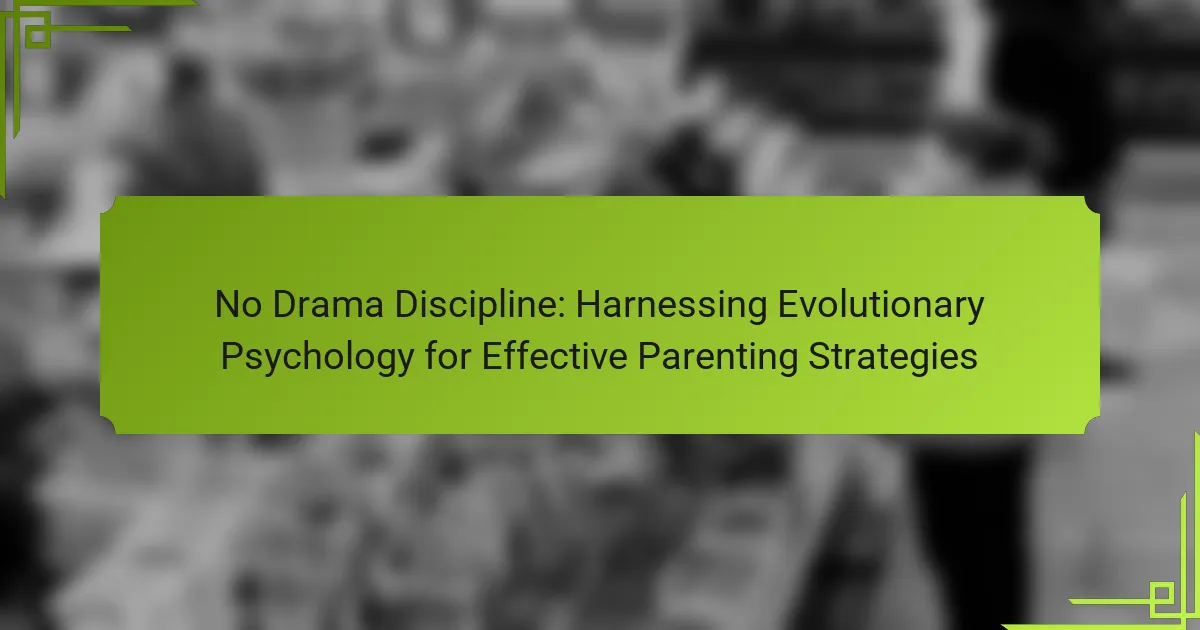Effective parenting requires strategies that foster emotional intelligence and resilience in children. No Drama Discipline utilizes insights from evolutionary psychology to enhance understanding of children’s behavior. This approach emphasizes empathy, consistency, and communication while avoiding punitive responses. By focusing on emotional connection and practical applications, parents can cultivate nurturing relationships that lead to lasting behavioral change.

How Does Evolutionary Psychology Inform No Drama Discipline?
Evolutionary psychology provides insights that enhance No Drama Discipline by emphasizing understanding children’s behavior. This approach focuses on the innate developmental needs of children, promoting empathy and connection. Recognizing that children are wired for attachment helps parents respond effectively to emotional outbursts. For instance, instead of reacting with frustration, parents can engage in calm discussions that foster emotional regulation. This method aligns with the root attribute of nurturing relationships, ultimately leading to more effective parenting strategies. The emphasis on evolutionary principles supports a holistic view of child development, making No Drama Discipline a valuable framework for modern parenting.
What Are the Key Principles of No Drama Discipline?
The key principles of No Drama Discipline focus on fostering connection and understanding between parent and child. These principles include maintaining calmness during discipline, understanding the child’s emotional state, and using discipline as an opportunity for learning rather than punishment. This approach emphasizes the importance of empathy and communication in guiding children’s behavior effectively. By prioritizing emotional regulation and teaching problem-solving skills, parents can create a nurturing environment that promotes growth and development.
How Does Understanding Child Development Enhance Parenting Strategies?
Understanding child development enhances parenting strategies by aligning discipline methods with children’s emotional and cognitive needs. This approach fosters secure attachments and promotes self-regulation. Research indicates that applying principles from evolutionary psychology, such as understanding behavioral triggers, can lead to more effective communication and conflict resolution. Consequently, parents can cultivate a nurturing environment that supports growth and learning, ultimately improving the parent-child relationship.

What Are the Universal Attributes of Effective Parenting Strategies?
Effective parenting strategies focus on empathy, consistency, and communication. These universal attributes foster a nurturing environment that promotes emotional intelligence and resilience in children. Empathy helps parents understand their child’s feelings, while consistency establishes trust and security. Communication encourages open dialogue, allowing children to express themselves and learn problem-solving skills. Together, these attributes create a foundation for effective discipline and positive parent-child relationships.
How Do Emotional Regulation Techniques Benefit Parent-Child Relationships?
Emotional regulation techniques strengthen parent-child relationships by fostering understanding and empathy. These strategies help parents model emotional responses, leading to healthier communication. As a result, children learn to manage their emotions effectively, enhancing their social skills and reducing behavioral issues. Research indicates that emotionally regulated interactions promote secure attachments, which are crucial for child development. By implementing these techniques, parents create a supportive environment that encourages emotional growth and resilience in their children.
What Role Does Empathy Play in Parenting?
Empathy is crucial in parenting as it fosters emotional connection and understanding between parent and child. It enhances communication, allowing parents to respond to their child’s needs effectively. Research shows that empathetic parenting leads to better emotional regulation in children, promoting resilience and social skills. By recognizing their child’s feelings, parents can guide them through challenges, reinforcing a supportive environment. This approach aligns with “No Drama Discipline,” emphasizing the importance of emotional intelligence in effective parenting strategies.
How Can Consistency in Parenting Techniques Improve Outcomes?
Consistency in parenting techniques enhances child behavior and emotional regulation. By applying “No Drama Discipline,” parents can create a stable environment that promotes understanding and respect. This approach aligns with evolutionary psychology, which suggests that predictable responses to behavior foster secure attachments. Children thrive when they know what to expect, leading to improved relationships and outcomes. Research indicates that consistent discipline reduces anxiety and fosters resilience in children. By maintaining uniform strategies, parents can effectively guide their children through challenges, ultimately enhancing their overall development.

What Unique Attributes Distinguish No Drama Discipline from Other Approaches?
No Drama Discipline is distinct due to its integration of evolutionary psychology, focusing on emotional connection rather than punishment. This approach emphasizes understanding children’s behavior through the lens of brain development, fostering empathy and effective communication. Unique attributes include its emphasis on nurturing relationships, prioritizing emotional regulation, and providing practical strategies that align with children’s developmental stages. By contrasting with traditional discipline methods, No Drama Discipline promotes cooperation over compliance, leading to lasting behavioral change.
How Does the Focus on Connection Over Correction Transform Parenting?
Focusing on connection over correction transforms parenting by fostering emotional bonds and understanding. This approach reduces conflict and promotes cooperation, leading to healthier parent-child relationships. Research indicates that children thrive in environments where they feel emotionally connected, which enhances their ability to learn and adapt. By prioritizing connection, parents can effectively guide behavior without resorting to punitive measures, ultimately cultivating resilience and emotional intelligence in their children.
What Are the Benefits of a Neurobiological Perspective on Discipline?
A neurobiological perspective on discipline enhances understanding of child behavior and promotes effective parenting strategies. This approach emphasizes empathy, fostering emotional regulation, and recognizing the developmental stages of children. By aligning discipline with brain development, parents can create a supportive environment that encourages positive behavior. This perspective also highlights the importance of building secure attachments, which can lead to improved emotional resilience in children.

What Rare Attributes Can Enhance the Effectiveness of No Drama Discipline?
Utilizing rare attributes can significantly enhance the effectiveness of No Drama Discipline. These attributes include emotional attunement, which fosters deep connections and understanding between parent and child. Another rare attribute is the integration of mindfulness practices, promoting awareness and presence during discipline moments. Additionally, the use of storytelling can convey lessons in a relatable manner, making the messages more impactful. Lastly, incorporating collaborative problem-solving encourages children to actively participate in resolving conflicts, reinforcing their sense of agency and responsibility.
How Can Understanding Attachment Styles Influence Discipline Strategies?
Understanding attachment styles can significantly enhance discipline strategies by tailoring approaches to children’s emotional needs. Recognizing whether a child has a secure, anxious, or avoidant attachment style allows parents to adapt their discipline methods accordingly. For example, children with secure attachment may respond well to consistent boundaries, while those with anxious attachment might benefit from more reassurance during discipline. This personalized approach fosters trust and cooperation, ultimately leading to more effective parenting outcomes.
What Innovative Techniques Can Parents Use to Apply Evolutionary Psychology?
Parents can apply evolutionary psychology through innovative techniques like understanding innate behaviors and adapting discipline methods. Emphasizing natural consequences aligns with children’s instincts, fostering better cooperation. Using storytelling taps into children’s evolutionary predisposition for narrative learning, making lessons more relatable. Additionally, implementing consistent routines mirrors ancestral environments, promoting security and compliance. Engaging in collaborative problem-solving encourages shared responsibility, reflecting social dynamics from our evolutionary past.

What Are the Practical Applications of No Drama Discipline in Daily Parenting?
No Drama Discipline offers practical applications in daily parenting by fostering emotional connection and understanding. Parents can implement strategies that focus on empathy and communication, leading to better behavior management. For example, using calming techniques during conflicts helps children process emotions effectively. This approach encourages children to express feelings, enhancing their emotional intelligence. Additionally, modeling self-regulation allows parents to set a positive example, promoting a harmonious family environment. Overall, No Drama Discipline equips parents with tools to nurture resilience and cooperation in their children.
How Can Parents Create a Calm Environment for Discipline?
Parents can create a calm environment for discipline by fostering emotional safety and using clear communication. Establishing routines helps children anticipate expectations, reducing anxiety. Incorporating evolutionary psychology principles, parents can respond to behavior with empathy, promoting understanding rather than fear. This approach encourages cooperation and respect, essential for effective discipline.
What Steps Can Parents Take to Implement No Drama Discipline Effectively?
Parents can implement No Drama Discipline effectively by maintaining calmness, setting clear expectations, and using empathetic communication. Establishing a safe environment fosters open dialogue, allowing children to express feelings. Consistency in discipline techniques reinforces learning and helps children understand consequences. Engaging in role-playing scenarios can provide practical applications of lessons. Finally, reflecting on personal parenting approaches can enhance effectiveness, ensuring alignment with No Drama Discipline principles.

What Common Mistakes Should Parents Avoid When Using No Drama Discipline?
Parents should avoid being overly punitive, dismissive of emotions, or inconsistent in their approach when using No Drama Discipline. These mistakes can undermine the effectiveness of this strategy.
1. Overly Punitive Responses: Reacting with harsh discipline can escalate conflicts and reduce a child’s willingness to engage in open communication.
2. Dismissing Emotions: Ignoring a child’s feelings can hinder emotional development and damage trust between parent and child.
3. Inconsistent Application: Fluctuating between strict and lenient responses can confuse children, making it difficult for them to understand expectations.
4. Lack of Empathy: Failing to acknowledge a child’s perspective can lead to feelings of isolation and resentment, reducing the effectiveness of discipline.
5. Focusing Solely on Behavior: Concentrating only on correcting behavior neglects the underlying emotional needs that drive that behavior.
How Can Parents Recognize and Adjust Ineffective Responses?
Parents can recognize ineffective responses by observing their child’s behavior and emotional reactions. Adjusting these responses involves applying principles from No Drama Discipline. This approach emphasizes empathy and understanding instead of reactive discipline methods.
To identify ineffective responses, parents should look for signs of increased defiance, withdrawal, or emotional distress in their children. These behaviors often indicate that traditional disciplinary techniques are not working. Instead, parents can foster a supportive environment that encourages open communication and emotional regulation.
One effective strategy is to pause before responding to a child’s behavior. This allows parents to assess the situation calmly and choose a more productive response. For example, instead of reacting with frustration, parents can ask questions to understand the child’s feelings and motivations.
Additionally, implementing consistent routines and clear expectations can help children feel secure and reduce instances of ineffective responses. Establishing these structures allows parents to guide their children more effectively, reinforcing positive behavior while minimizing conflict.
What Are the Best Practices for Maintaining Consistency in Discipline?
To maintain consistency in discipline, parents should establish clear expectations and consequences. Consistent discipline fosters a secure environment, enabling children to understand boundaries and the importance of self-regulation.
One effective practice is to communicate rules clearly and regularly, ensuring children comprehend the rationale behind them. Another key strategy involves modeling appropriate behavior; children learn by observing their parents.
Additionally, using positive reinforcement can encourage desired behaviors while maintaining discipline. This approach aligns with the principles of No Drama Discipline, emphasizing emotional connection and understanding.
Finally, regular check-ins with children about their feelings and behaviors can help parents adjust their strategies and maintain consistency in discipline.
How Can Parents Seek Support and Resources for Effective Implementation?
Parents can seek support and resources through parenting workshops, online forums, and books focused on No Drama Discipline. These resources provide insights into evolutionary psychology and practical strategies for effective parenting. Engaging with community groups can also foster shared experiences and advice. Local libraries often have parenting sections with valuable literature. Online platforms like webinars and podcasts offer expert guidance and real-life applications.
